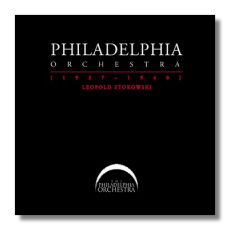
The Internet's Premier Classical Music Source
Related Links
- Latest Reviews
- More Reviews
-
By Composer
-
Collections
DVD & Blu-ray
Books
Concert Reviews
Articles/Interviews
Software
Audio
Search Amazon
Recommended Links
Site News
 CD Review
CD Review
Leopold Stokowski Conducts the Philadelphia Orchestra

1927 - 1940
- Arnold Schoenberg: Gurrelieder (1932)
- Arcady Dubensky: The Raven
- Paul Hindemith: Kammermusik #2
- Nicolai Rimsky-Korsakoff: The Maid of Pskov (Hunt and Storm) 1939
- Modest Mussorgsky:
- Khovantschina (Entr'acte from Act 4) 1927
- Boris Godunov (Symphonic Synthesis by Stokowski) 1936
- Reinhold Glière:
- Symphony #3 "Ilya Muromets" 1940
- The Red Poppy: Russian Sailors' Dance (1934)
- Claude Debussy:
- Prélude to the Afternoon of a Faun (1927 and 1940)
- Nocturnes (1937/39)
- Danses Sacred and Profane (1931)
- Maurice Ravel: Rapsodie espagñole (1934)
Philadelphia Orchestra/Leopold Stokowski
Andante 4978 4CDs
Ever wonder how many other recordings there were of Schoenberg's Gurrelieder in1932. How about how many Glière Symphony #3s in 1940. Then there's Hindemith!! I wouldn't bother to check it out because the probability is that Stokowski had the field to himself. This is one of the reasons lovers of classical music were in his debt then and frankly now, too. We sometimes forget that the present would look a lot different if it weren't for people like Stokowski. He brought recordings of music to people that otherwise would have been without. I don't know how well they sold, but undoubtedly many people purchased the recordings simply because of Stokowski's name.
This set features a lot of "modern" music. Modern of course is relative in this context. Consider that when Stokowski was born Brahms was still a living composer. But it must be taken into account that starting off we have Schoenberg's Gurrelieder and this is hardly Brahms. This recording is from a live performance in 1932. As the notes make clear, this is not the same recording previously issued on Pearl. That one was from experimental 33 1/3 masters whilst this one was from 78s and sounds better. Well, it does. This is early Schoenberg, à la Verklärte Nacht. It sounds at turns like Strauss or Wagner, but most of all I think of Debussy's Pelléas. I particularly like the sound of the tenor, Paul Althouse. As usual with me, the 'plot' makes me want to puke. So it goes.
I will be honest; the Dubensky is just plain bad music. I reserve that comment for really rare occasions because I know that what I think is bad is still within the realm of the singularity. On the other hand I don't feel really threatened that my opinion will be significantly challenged. That is, why the hell was this included at the expense of other possibilities?
The Hindemith was never released. I am not sure why but it has been suggested that perhaps there was too much piano and too little orchestra. Frankly I think the whole thing sounds too academic… as does most Hindemith to me. Pr'aps some day I will change my mind but this ain't that day. Of course you may disagree with me and this is a chance to hear the legendary Eunice Norton.
Disc three offers two main courses: Stokowski's Symphonic Synthesis of Mussrogsky's Boris Godunov and Glière's Symphony #3. I pulled out Ward Marston's remastering of the Glière first, on Pearl, to listen for any differences in sound. There is more clarity, birdcalls in particular are more noticeable and delightful as a result, and separation of instruments is also better heard. If you are not familiar with Stokowski's recording be warned that he makes massive cuts, reducing it from over an hour to 45 minutes. Having listened to the uncut version I can attest to the fact that the cuts do no harm and in fact make it better. The "Boris" Synthesis is one of the other contributions Stokowski made to listeners of the day. A complete recording was not around and would have required a truck to get it to a house. The constant getting up every three to four minutes to change sides would have given anyone a real workout. Stokowski allowed listeners to appreciate what Mussorgsky had to offer. In fact, it is still a good way to familiarize yourself with the music before dipping into a complete recording. The sound, again, offers more detail and greater instrumental separation.
Disc four is my favorite of the lot. I pulled out Biddulph's French disc 013 remastered by Mark Obert-Thorn to once again compare the mastering jobs. The Prélude to the Afternoon of a Faun (1940) was the focus point. The sound on the Andante discs is significantly different from the Biddulph release. The Andante release has much more detail and is cleaner but is also less reverberant. The Biddulph is also warmer to these ears. Which do I prefer? Well, since I don't have to choose I am glad to have both. On the other hand, we have the juxtaposition of the first CD release of Stokowski's 1927 recording. The other items sound great and no comparisons were made.
After listening to the set several times I have to confess that I believe Andante could have done better by Stokowski and by themselves to have changed the menu. There are the Shostakovich Symphonies if you want "modern". Also there is Stravinsky's "Rite" and I could go on. The Glière is okay but, again, I would have preferred other fare. The set is primarily for Stokowski compleatists.
Copyright © 2002, Robert Stumpf II


















